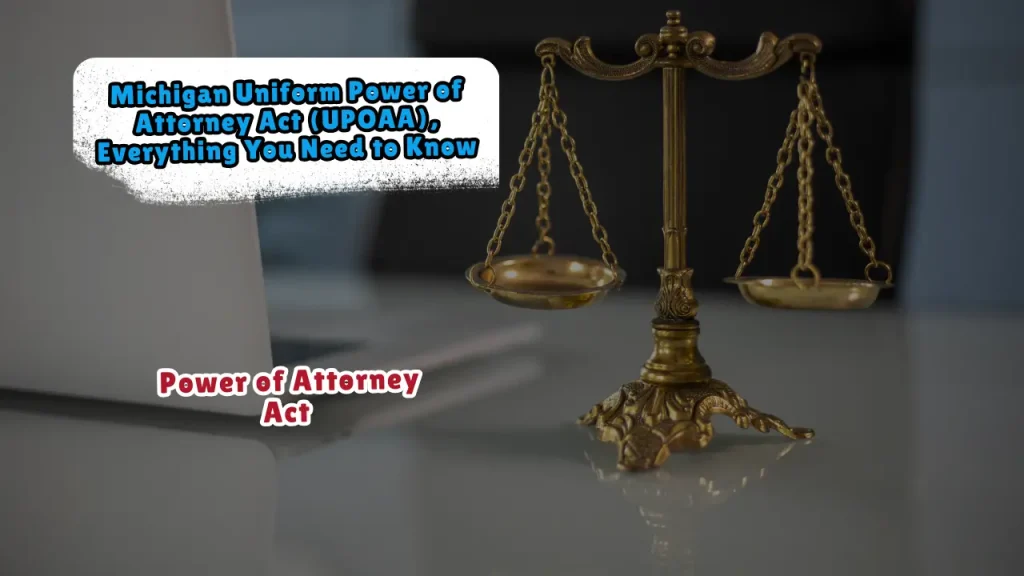Michigan Uniform Power of Attorney Act (UPOAA), Everything You Need to Know
Starting July 1, 2024, Michigan officially adopted the Uniform Power of Attorney Act (UPOAA), making major changes to how financial powers of attorney are created, used, and recognized. With this law, Michigan joins over 30 other states in simplifying the POA process, protecting vulnerable individuals, and encouraging uniformity across state lines.
Below is a detailed breakdown of what the UPOAA means for Michigan residents, how it differs from older rules, and what steps you should take to stay compliant.
Table of Contents
What Is the UPOAA?
The UPOAA is a standardized legal framework that governs financial powers of attorney. It replaces Michigan’s previous rules under the Estates and Protected Individuals Code (EPIC) and introduces uniform rules about how POAs are executed, what powers agents have, and how third parties (like banks) must respond to POAs.
Key Features of the UPOAA
1. POAs Are Durable by Default
If a POA is created after July 1, 2024, it automatically remains valid even if the person who created it (the “principal”) becomes mentally incapacitated. This is a shift from the old system where special wording was required to make a POA durable.
2. Execution Requirements Are Clearer
Under the UPOAA, a POA must be:
- Notarized, or
- Signed in front of two witnesses (who cannot be named as the agent)
This makes it harder for financial institutions to reject valid POAs. A notarized POA gets a presumption of validity.
3. Agents Have Stricter Responsibilities
Agents must:
- Act in the principal’s best interest
- Keep accurate records of financial transactions
- Avoid conflicts of interest
- Share records if requested by the principal or an authorized third party
If an agent breaks these duties, they can be held personally liable.
4. Banks and Third Parties Must Accept Valid POAs
If a POA meets UPOAA requirements, third parties can’t reject it without a valid reason like suspected fraud. Unjustified refusal can lead to legal penalties, including being ordered by a court to honor the POA and pay damages.
5. Multiple Agents and Successors Allowed
You can name multiple co-agents who act together or independently, depending on what the POA says. You can also name backup agents in case your first choice can’t serve.
What Happens to Older POAs?
If you created a POA before July 1, 2024, it’s still valid as long as it was legally executed under the old law. However, it’s smart to update it using the new rules, especially notarization, to reduce the risk of banks rejecting it.
Steps to Create or Update a POA Under the UPOAA
- Use the Official Form: Michigan now provides a standardized POA form that includes explanations, sample language, and a section for agent acknowledgment.
- Choose Your Agent Wisely: Pick someone you trust completely. Make sure they understand the duties required by the law.
- Get It Properly Signed: Notarization is preferred for stronger legal standing. Alternatively, sign in front of two witnesses who are not your agent.
- Distribute Copies: Give the final POA to your agent, your bank, and anyone else who might need to act on your behalf.
- Revoke Older Versions: Write a clear revocation notice for any prior POAs to avoid confusion.
Other Important Points
- Springing Powers: You can choose to have the POA take effect only if you become incapacitated. This needs to be clearly stated.
- Out-of-State POAs: Michigan will honor POAs made under other states’ laws if they were valid when created.
- Health Care Not Covered: The UPOAA only applies to financial matters. It does not cover health care directives like patient advocate designations.
Related article for you:
Does a Personal Representative Have Power of Attorney? Key Differences

Why the UPOAA Matters
“The UPOAA finally gives Michigan residents a practical and secure way to prepare for financial incapacity while making it harder for bad actors to take advantage.” – Laura Athens, Michigan Elder Law Attorney
The UPOAA reduces the need for court-appointed guardians by making it easier for people to manage their affairs privately and securely. It also promotes consistency, so if you move or own property in another state, your POA is more likely to be accepted.
Quick Checklist for Michigan Residents
For more details and to download the official POA form, visit Michigan.gov.
About the Author

Sarah Klein, JD, is an experienced estate planning attorney who has helped clients with wills, trusts, powers of attorney, and probate matters. At All About Lawyer, she simplifies complex estate laws so families can protect their assets, plan ahead, and avoid legal headaches during life’s most sensitive moments.
Read more about Sarah
